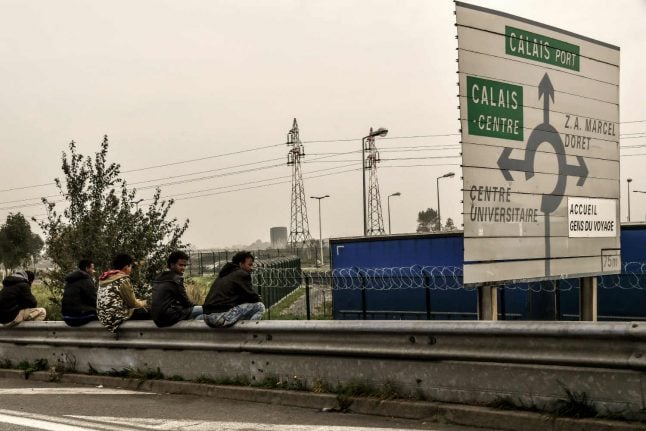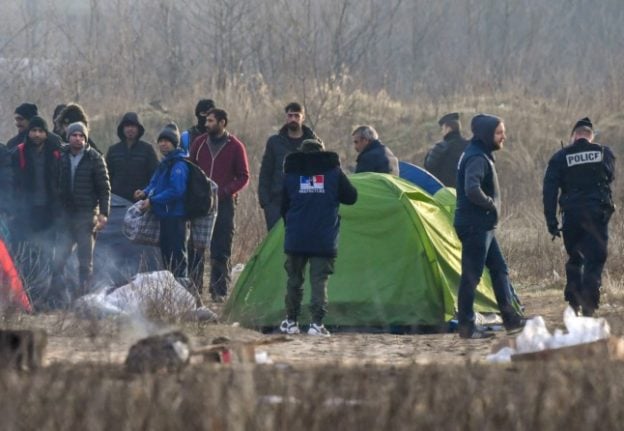The number of nightly break-ins into trucks heading for Britain has been divided by three, while intrusions at the tunnel linking France and Britain have stopped. Mass outbreaks of fighting which required police interventions have also ceased.
“The pressure from migration has fallen sharply,” Sudry, who as the local “prefet” is in charge of law and order, told AFP. “There are around 500 migrants today compared with 8,000 a year ago.”
The mass clearance of the Jungle in October last year saw French authorities order its occupants — most of them young men from Syria, Sudan, Afghanistan or Iraq — to accommodation around France. Then the bulldozers were sent in.
The move was decried as heavy-handed by some critics and activists, while pictures of the destruction were published around the world as a vivid illustration of Europe's struggle to cope with the unprecedented surge of arrivals.
“I continue to think that dismantling the Jungle was a success and a model for cooperation between the state and associations,” said aid worker Stephane Duval, who works for the Vie Active local association, which partnered with the state.
The “Jungle” was the latest of a series of camps which had sprung up on the northern coast of France as a temporary home for migrants who, rather than apply for asylum in France, dreamt of reaching Britain.
But after 18 months, and faced with the growing disruption at the port, an unhappy local population in Calais and criticism from the United Nations and rights groups, the then-Socialist government decided to act.
“The evacuation went very well, they (the migrants) were impatient to be accepted in France somewhere else other than here,” said the head of local charity l'Auberge des Migrants, Christian Salome.
Sending them to temporary accommodation and asylum centres around the country proved controversial, however, with local mayors in some towns and villages saying they had not been consulted.
A far-right major in southern France put up posters featuring the words “The state is imposing them… migrants are coming” over a picture of a crowd of dark-skinned men in front of the town's cathedral.
READ ALSO:
- France provides toilets and taps for Calais migrants
- Majority of Calais migrants sleep less than four hours per night
- After Calais, France faces growing migrant crisis in Paris
Of the 7,400 people who left the Jungle, 42 percent have had their asylum request accepted since, 7.0 percent were rejected, while 46 percent are still waiting for a response, official figures show.
The number of arrivals in Europe has fallen sharply over the last 12 months after the biggest refugee crisis since the Second World War.
In 2016, a deal between the European Union and Turkey all but closed down the most popular eastern route for refugees and migrants heading towards the richest northern countries of the bloc.
And a crossing point between Libya and Italy has also been restricted over recent months, with EU President Donald Tusk saying Friday that there was a “real chance” to close this central route.
In Calais, local associations put the number of migrants sleeping rough around the town at around 600-700 and they have sounded the alarm about “catastrophic” conditions.
Interior Minister Gerard Collomb, who took office in the new centrist government in May, has been resolute that no camp should be allowed to spring up again, leading police to be criticised for harassing migrants and restricting the work of local charities.
A few portable toilets and water taps were installed reluctantly on a road near the port, but only after the government was forced by a court order to provide basic sanitation facilities.
Local associations recall a promise to build a permanent centre to house refugees in Calais made by former interior minister Bernard Cazeneuve at the time the Jungle was destroyed.
“We need accommodation in Calais urgently because the majority of the migrants can't be sent back home,” said Jean-Claude Lenoir, the head of the Salam charity which supported the government last year.
READ ALSO: French police clash with migrants in Calais



 Please whitelist us to continue reading.
Please whitelist us to continue reading.